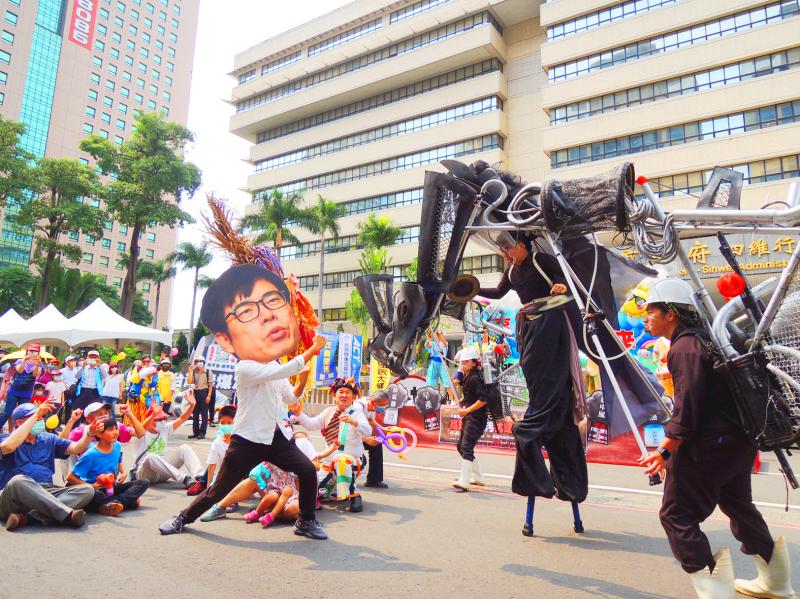Environmental protection groups in Kaohsiung yesterday protested against air pollution and global warming, urging the local and central governments to pay attention to the effects of air pollution on people’s health in southern Taiwan.
The groups demanded that the coal-fired Hsinta Power Plant (興達) in Kaohsiung be closed; China Steel Corp, the nation’s biggest steelmaker, close one blast furnace; the threshold for air pollution emergency response measures be lowered; and air purifiers be installed in all classrooms.
The average life expectancy of Kaohsiung residents is the lowest among the nation’s six special municipalities, South Taiwan Air Clear spokesman Lee Chien-cheng (李建誠) said.

Photo: Wang Jung-hsiang, Taipei Times
The city’s infant mortality rate and lung adenocarcinoma incidence rate in the past 10 years were the highest among the six special municipalities, Lee said.
Kaohsiung residents would prefer better air quality to protect their children over this year’s Double Ten National Day fireworks display, which Kaohsiung Mayor Chen Chi-mai’s (陳其邁) announced last month would be held in the city, he said.
Air Clean Taiwan chairman Yeh Guang-perng (葉光芃) said the annual mean concentration of particulate matter smaller than 2.5 micrometers in Toronto is 5.9 micrograms per cubic meter, but it is 19.9 micrograms per cubic meter in Kaohsiung, which is about 3.4 times as much.
Chen said the fireworks display is part of the national celebration, adding that the city government would strive to make “the best arrangement” by assessing the appropriate location for the show.
Chen also pledged that no new coal-fired power generators would be installed in the city and echoed the groups’ demand that the Hsinta Power Plant be retired by 2025.
The city would expand its photovoltaic power generation capacity, and promote the use of solar power arrays on fish farms in the next six years to achieve a coal-free Kaohsiung by 2030 and net-zero carbon emissions by 2050, he said.

A drunk woman was sexually assaulted inside a crowded concourse of Taipei Railway Station on Thursday last week before a foreign tourist notified police, leading to calls for better education on bystander intervention and review of security infrastructure. The man, surnamed Chiu (邱), was taken into custody on charges of sexual assault, taking advantage of the woman’s condition and public indecency. Police discovered that Chiu was a fugitive with prior convictions for vehicle theft. He has been taken into custody and is to complete his unserved six-month sentence, police said. On Thursday last week, Chiu was seen wearing a white

The Taoyuan Flight Attendants’ Union yesterday vowed to protest at the EVA Air Marathon on Sunday next week should EVA Airway Corp’s management continue to ignore the union’s petition to change rules on employees’ leave of absence system, after a flight attendant reportedly died after working on a long-haul flight while ill. The case has generated public discussion over whether taking personal or sick leave should affect a worker’s performance review. Several union members yesterday protested at the Legislative Yuan, holding white flowers and placards, while shouting: “Life is priceless; requesting leave is not a crime.” “The union is scheduled to meet with

‘UNITED FRONT’ RHETORIC: China’s TAO also plans to hold weekly, instead of biweekly, news conferences because it wants to control the cross-strait discourse, an expert said China’s plan to expand its single-entry visa-on-arrival service to Taiwanese would be of limited interest to Taiwanese and is a feeble attempt by Chinese administrators to demonstrate that they are doing something, the Mainland Affairs Council said yesterday. China’s Taiwan Affairs Office (TAO) spokesman Chen Binhua (陳斌華) said the program aims to facilitate travel to China for Taiwanese compatriots, regardless of whether they are arriving via direct flights or are entering mainland China through Hong Kong, Macau or other countries, and they would be able to apply for a single-entry visa-on-arrival at all eligible entry points in China. The policy aims

COUNTERMEASURE: Taiwan was to implement controls for 47 tech products bound for South Africa after the latter downgraded and renamed Taipei’s ‘de facto’ offices The Ministry of Foreign Affairs is still reviewing a new agreement proposed by the South African government last month to regulate the status of reciprocal representative offices, Minister of Foreign Affairs Lin Chia-lung (林佳龍) said yesterday. Asked about the latest developments in a year-long controversy over Taiwan’s de facto representative office in South Africa, Lin during a legislative session said that the ministry was consulting with legal experts on the proposed new agreement. While the new proposal offers Taiwan greater flexibility, the ministry does not find it acceptable, Lin said without elaborating. The ministry is still open to resuming retaliatory measures against South